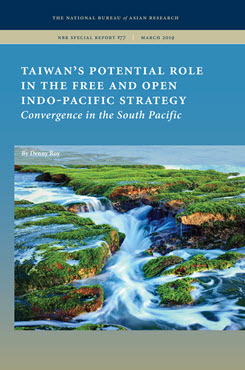by Denny Roy
 This report examines the role of the Pacific Islands in Taiwan’s grand strategy and argues that Taiwan’s struggle to maintain formal diplomatic relations with these states dovetails with the United States’ reformulated Indo-Pacific strategy, even if Washington has yet to articulate a clear plan for coordinating activities in the South Pacific with Taipei.
This report examines the role of the Pacific Islands in Taiwan’s grand strategy and argues that Taiwan’s struggle to maintain formal diplomatic relations with these states dovetails with the United States’ reformulated Indo-Pacific strategy, even if Washington has yet to articulate a clear plan for coordinating activities in the South Pacific with Taipei.
The long-standing rivalry between Taiwan and China for diplomatic recognition among the Pacific Island states in some respects mirrors the larger competition between the U.S. and China for influence in the Asia-Pacific region, now reformulated as the “Indo-Pacific.” Taiwan’s activities in the Pacific Islands are largely supportive of the goals of the U.S. “free and open Indo-Pacific” strategy (FOIP), and Taipei has openly expressed willingness to partner with Washington at a time when China has a clear and growing commitment to exploiting Oceania for political, economic, and strategic gains. The U.S. government, however, lacks a concept or plan for cooperating with Taiwan either in the South Pacific or elsewhere in the region. Consequently, Taiwan acts as an unacknowledged partner.
POLICY IMPLICATIONS
Intensified U.S.-China competition and the U.S. commitment to the objectives enumerated in FOIP increase the value of a de facto independent Taiwan for the U.S.
Taiwan’s Pacific Islands policy and the U.S.’s FOIP have common interests in deepening investments in and ties with regional countries as a counter to Chinese influence. Taiwan offers the Pacific Islands an alternative to engagement with China, which could enhance China’s platforms for challenging the liberal regional order.
A closer Washington-Taipei working relationship would have the disadvantage, however, of increasing Beijing’s sense of regime insecurity and heighten the possibility that it might lash out aggressively.
A sensible middle path for the U.S. is to quietly support Taiwan’s efforts to improve its standing in the Pacific Islands. This would help Taiwan fulfill its potential as a contributor to FOIP, in this case by deepening the influence of the liberal bloc in a strategically important subregion.Denny Roy is a Senior Fellow and Supervisor of the POSCO Fellowship Program at the East-West Center in Honolulu.
No comments:
Post a Comment